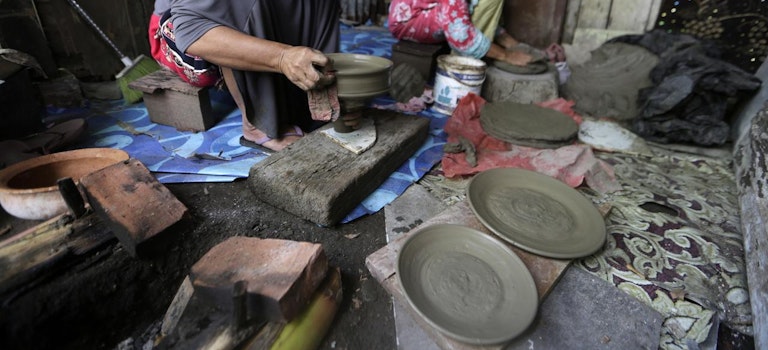The UN agency’s Global Wage Report published Wednesday found that wages fell or stagnated in the first six months of the year in two-thirds of the countries it monitors, with lower-paid workers and women disproportionately affected due to both the loss of jobs and reduced hours.
While average wages in the remaining one third of the countries seemed to increase - Brazil, France and the United States included - this was largely skewed by a large number of lower-paid workers losing their jobs and therefore no longer being included in the data for wage-earners.
Mind the gender gap. The impact of the crisis has hit women harder than men in ways that could widen the gender gaps in the labour market and possibly wipe out the progress made over the past few years, the ILO said.
Without wage subsidies, such as furlough schemes, women would have lost 8.1 per cent of their wages in the second quarter, compared to 5.4 per cent for men, according to a sample of 28 European countries.
Women account for a higher majority of workers at the front-lines of the pandemic, making up 70 per cent of jobs in health and social work, for example. They are also more exposed to the hardest-hit sectors such as retail and hospitality, as seen in recent employment statistics released in Australia, Canada, Colombia, Japan, the Republic of Korea and the United States.
With day cares and many schools closed during the pandemic, parents have struggled to balance home and work responsibilities, with women taking on an unequal share of the household work, the ILO said. A separate study released this summer by the Boston Consulting Group, which surveyed more than 3,000 people in the US and Europe, found that working women currently spend an average of 15 hours a week more on unpaid domestic labour than men.
Government aid to the rescue. The good news from the ILO report is that unprecedented fiscal action taken by governments during the lockdown has helped in large part mitigate the effects of the crisis on the labour market.
Without subsidies, the average amount of wages lost across all groups would have been 6.5 per cent. However, wage subsidies helped to compensate for 40 per cent of this amount. Subsidies are also more likely to help lower-paid workers, which in turn has helped mitigate growing wage inequality. But government measures will not be enough to compensate for the overall impact of the crisis.
“The growth in inequality created by the Covid-19 crisis threatens a legacy of poverty and social and economic instability that would be devastating,” said ILO director-general Guy Ryder.
“Our recovery strategy must be human-centred. We need adequate wage policies that take into account the sustainability of jobs and enterprises, and also address inequalities and the need to sustain demand. If we are going to build a better future we must also deal with some uncomfortable questions about why jobs with high social value, like carers and teachers, are very often linked to low pay.”
A vaccine is not the only shot in the arm for the economy. Looking ahead, Ryder said the crisis will continue to put a “downward pressure” on wages, warning that the roll-out of Covid-19 vaccines “does not solve the economic, social situation that we are in”.
“It is a shot in the arm for each of us and is good for our health,” he told reporters, “but is not, in and of itself, a shot in the arm for the economy. That has to come from other things. Those things being wage subsidies, job retention - everything that governments around the world have been putting in place to the tune of between $11-12 trillion worldwide to keep the economy going”.
Minimum wages key to economic recovery. The report also examines minimum wage systems among its member countries and finds that, even before Covid-19, 266 million people – or 15 per cent of all wage earners worldwide – were earning less than the hourly minimum wage, either because of non-compliance or because they were legally excluded from such scheme.
Extending coverage to more workers, updating minimum-wage levels and introducing better compliance will play a crucial role in the economic recovery, the organisation said, and in turn help more people away from informal work and into the formal sector.
#ILO #Minimum wage #women #Gender lens investing #gender
